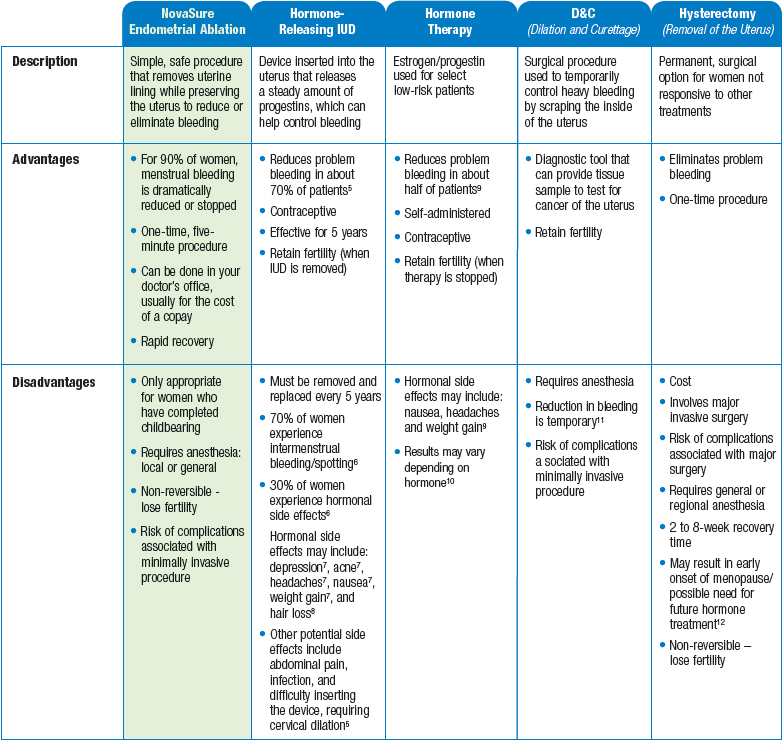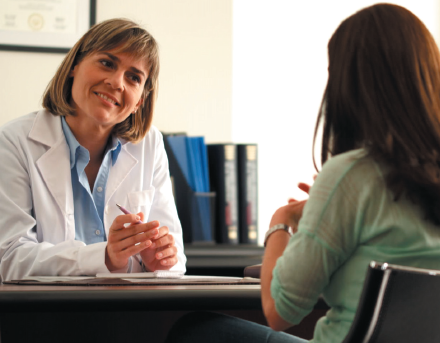- Reference Number: HEY307/2016E
- Departments: Gynaecology
- Last Updated: 31 July 2016

Over a million women have been treated with NovaSure®. (*1)

NovaSure Endometrial Ablation (EA) is the simple, one-time, five-minute procedure that has treated over one million women—without hormones or hysterectomy.
NovaSure is for premenopausal women with heavy periods due to benign causes who are finished childbearing. Pregnancy following NovaSure can be dangerous. NovaSure is not for those who have or suspect uterine cancer, have an active genital, urinary or pelvic infection, an IUD or a metal uterine implant. Rare but serious risks include thermal injury, perforation, infection and other problems. Temporary side effects may include cramping, nausea, vomiting, discharge and spotting. Talk to your doctor for more information. NovaSure is not a sterilization procedure and not for women who may be pregnant.
This leaflet contains information about heavy menstrual bleeding as well as treatment options, including NovaSure.
Talk to your doctor.
Your doctor can explain the various treatment options for heavy periods and help you decide if NovaSure® is right for you.
Do heavy periods affect your life?
It’s estimated that heavy menstrual bleeding affects 1 out of every 5 women—that’s about 10 million women! (*2)
Many women begin to experience heavy and/or irregular bleeding in their 30s and 40s, as they begin to get closer to menopause. Heavy periods take a physical, social, and emotional toll as well.
Studies show heavy periods mean more than heavy bleeding. They can affect women in a number of ways:
Physical:
- Many feel tired and nauseated.
- Many experience bad cramps.
- Many have headaches.
Social:
- More than 60% have had to miss social or athletic events. (*3)
- About 80% report avoiding sex. (*2)
- 33% have been forced to miss work. (*3)
Emotional:
- 77% have depression or moodiness. (*2)
- 75% feel anxious. (*3)
- 57% report a lack of confidence during their period. (*3)
What is NovaSure?
NovaSure is a one-time, five-minute procedure that can lighten or end your heavy period. No pills. No hormonal side effects. For 90% of women, menstrual bleeding is dramatically reduced or stopped. It’s a simple procedure that can be done in your doctor’s office, usually for the cost of a copay.
The benefits of the NovaSure procedure:
- One-time procedure.
- The procedure is quick—it usually takes less than five minutes.
- It can be performed in a doctor’s office with no general anesthesia.
- 90% of women returned to normal, light or no periods at all. (*3)
- 40% reported that their periods stopped completely. (*3)
- Most women experience mild or no pain during or after the procedure. (*4)
- Most women feel back to themselves within a day or so. (*3)
- There are no incisions (an incision is a cut into your body).
- It can be performed at any time during your cycle, even if you’re bleeding.
- You don’t need to prepare by taking any pre-treatment medicine.
Choosing the right treatment for you.
There are a number of treatment options available. The chart below highlights the advantages and disadvantages of the most common options. Your doctor can help you decide which treatment may be right for you.

How does NovaSure® work?
NovaSure is an endometrial ablation (EA) procedure that can reduce or stop menstrual bleeding. It works by permanently removing the endometrium, or the lining of the uterus (the part that causes the bleeding), with a quick delivery of radio frequency energy.

No part of the NovaSure device remains inside your body after the procedure.
Are women satisfied with the NovaSure® procedure?
In a clinical study, twelve months after the NovaSure procedure:
- 95% of patients were satisfied with the results. (*3)
- 97% said they would recommend NovaSure to a friend. (*3)
Nearly 7 out of every 10 endometrial ablation procedures performed are NovaSure.
What can I expect?
Most women who have had the NovaSure procedure have lighter periods or no periods afterwards. In a clinical study, 9 out of 10 women returned to normal or light periods and 4 out of 10 stopped bleeding altogether. (*3)
… And more.
Many women who’ve had the NovaSure procedure say they are now able to spend more time at work and daily activities, missing out on fewer social and athletic outings because of heavy periods. They also report improved energy levels, better moods, and a boost in self-confidence. And many also had a significant reduction in painful periods and PMS symptoms like irritability. (*3)
Impact on quality of life. (*3)
| Answered “Always”, “Frequently”, Or “Sometimes” | Before NovaSure | After NovaSure |
| Do you lack confidence due to your period? | 57% | 16% |
| Do you have a problem working due to your period? | 66% | 10% |
| Do you spend less time at work or other activities? | 61% | 9% |
| Do you feel anxious due to your period? | 75% | 24% |
| Do your periods cause you to miss social activities? | 63% | 9% |
| Do your periods cause you to miss athletic activities? | 66% | 9% |
| Are you unable to work outside your home due to your periods? | 33% | 6% |
| Do you have less energy or a total lack of energy? | 84% | 24% |
| Do you experience painful periods? | 57% | 21% |
| Do you have PMS symptoms? | 65% | 36% |
Frequently asked questions about NovaSure®.
Is NovaSure right for me?
Women with heavy or long-lasting periods who do not wish to have children in the future may be candidates for the NovaSure procedure.
Your doctor can decide if NovaSure is right for you. But if you’re sure you don’t want any children in the future, and your doctor rules out more serious causes of heavy bleeding, you may be a good candidate for the NovaSure procedure.
Can I still become pregnant after the NovaSure procedure?
Because NovaSure treats the lining of the uterus, your chances of getting pregnant after the procedure will be reduced. However, it is still possible to get pregnant if you’re sexually active. A pregnancy after an ablation is very dangerous for both the mother and the fetus, since the uterine lining would not be able to properly support fetal development. It’s very important to talk to your doctor about what birth control you will use after the NovaSure procedure.
What can I expect after the NovaSure procedure?
Immediately after the NovaSure procedure, some women may experience some cramping, mild pain, nausea, and/or vomiting. Most women feel back to themselves and can resume normal activities within a day or so. Be sure to follow any instructions from your doctor, no matter how good you’re feeling.
A watery and/or bloody discharge following the NovaSure procedure is normal. It could start anywhere from immediately after the procedure to a couple of weeks afterwards. The discharge may last only briefly, or for up to a couple of months. It could even come and go, increasing after certain activities. This is quite normal and can be expected with any endometrial ablation procedure.
Are there any risks I should know about?
Your doctor will explain the risks of all treatment options. Some of the risks associated with EA procedures are making a hole in the uterus, bleeding, infection, bradycardia, injury to organs within the abdomen or around the uterus or complications leading to serious injury or death. These problems are very rare and reported at a rate of less than 0.05%. (*1)
Tell your doctor if you have a cardiac pacemaker or any other electrical device in your body.
Very few patients experience complications following the NovaSure procedure. But you should call your doctor right away if you develop:
- A fever higher than 100.4°F.
- Worsening pelvic pain that is not relieved by ibuprofen or other prescribed medicine.
- Nausea, vomiting, shortness of breath, dizziness.
- Bowel or bladder problems.
- A greenish vaginal discharge (reddish, yellowish, or brownish is normal).
When will I know what my periods will be like after the NovaSure procedure?
Every woman is different. But plan to give your body about 3 months to fully heal on the inside and resume its normal cycle. Then, you and your doctor should be able to tell what your cycle and your periods will be like from that point on.
Talking to your doctor about heavy menstrual bleeding.

Studies have shown that many women who suffer from heavy periods do not bring the subject up with their doctors or seek treatment.
Heavy periods are a problem that affects 1 out of every 5 women.
If getting the conversation started once you’re there seems hard, try one of these openers:
- “I’d like to ask you a few questions about my menstrual cycle…”
- “I’ve noticed that my periods are different than they used to be…”
- “I’ve heard that a lot of women are getting treated for heavy periods—is this something I should consider?”
If you suffer from heavy menstrual bleeding and do not wish to have any children in the future, be sure to ask your doctor if NovaSure may be right for you.
To find a physician in your area who performs NovaSure, go to www.novasure.com/patients/find-a-physician.
Heavy menstrual bleeding checklist.
Do any of the following statements apply to you?
![]() My period affects my quality of life.
My period affects my quality of life.
![]() I am bothered by the amount of bleeding or the pain that I have during my period.
I am bothered by the amount of bleeding or the pain that I have during my period.
![]() My period makes me feel depressed, tired or moody.
My period makes me feel depressed, tired or moody.
![]() I am afraid of having an embarrassing accident.
I am afraid of having an embarrassing accident.
![]() I have PMS symptoms, such as headaches, during my period.
I have PMS symptoms, such as headaches, during my period.
![]() I bleed more often than once a month.
I bleed more often than once a month.
![]() My period lasts too long.
My period lasts too long.
![]() My period affects my social, athletic, or sexual activities or causes me to miss work.
My period affects my social, athletic, or sexual activities or causes me to miss work.
![]() My life would improve if I could decrease or completely eliminate my period.
My life would improve if I could decrease or completely eliminate my period.
![]() I would like to learn about a simple procedure that can help me get back to my life.
I would like to learn about a simple procedure that can help me get back to my life.
Use the space below to write down any additional questions or concerns:
__________________________________________________________________________________________________________________________
__________________________________________________________________________________________________________________________
__________________________________________________________________________________________________________________________
__________________________________________________________________________________________________________________________
__________________________________________________________________________________________________________________________
__________________________________________________________________________________________________________________________
Bring this checklist with you to your next doctor’s appointment.
Contact information.
Website: www.novasure.com.
Telephone: 1-855-NOVASURE.
* References.
- Hologic Inc., Data on file, 2009. Based on units shipped from 2002-2010.
- National Women’s Health Resource Center. Survey of women who experience heavy menstrual bleeding Data on file; 2005.
- Cooper J, et al. A randomized, multicenter trial of safety and efficacy of the NovaSure system in the treatment of menorrhagia. J Am Assoc Gynecol Laparosc. 2002; 9:418-428.
- NovaSure Instructions For Use. Marlborough, MA: Hologic Inc.; 2009.
- Istre O, et al. Treatment of menorrhagia with levonorgestrel intrauterine system versus endometrial resection. Fertil Steril. 2001; 76:304-309.
- Hurskainen R, et al. Clinical outcomes and costs with the levonorgestrel releasing intrauterine system or hysterectomy for treatment of menorrhagia: randomized trial 5-year follow-up. JAMA. 2004; 291:1456-1463.
- Mirena [page insert].Wayne, NJ: Bayer HealthCare Pharmaceuticals Inc.; 2007.
- Backman T, Huhtala S, Blom T, Luoto R, Rauramo I, Koskenvuo M. Length of use and symptoms associated with premature removal of levonorgestrel intrauterine system: a nation-wide study of 17,360 users. BJOG 2000; 107:335-9.
- Cooper KG, et al. A randomised comparison of medical and hysteroscopic management in women consulting a gynaecologist for treatment of heavy menstrual loss. Br J Obstet Gynaecol. 1997; 104:1360-1366.
- Singh RH, et al. Hormonal management of abnormal uterine bleeding. Clin Obstet Gynecol. 2005; 48:337-352.
- Decherney AH, et al. Current Obstetric & Gynecologic Diagnosis & Treatment, ninth edition. New York, NY: McGraw-Hill Medical; 2003.
- Siddle N, et al. The effect of hysterectomy on the age at ovarian failure: identification of a subgroup of women with premature loss of ovarian function and literature review. Fertil Steril. 1987; 47:94-100.
© 2011 Hologic, Inc. All Rights Reserved.
![]()
General Advice and Consent
Most of your questions should have been answered by this leaflet, but remember that this is only a starting point for discussion with the healthcare team.
Consent to treatment
Before any doctor, nurse or therapist examines or treats you, they must seek your consent or permission. In order to make a decision, you need to have information from health professionals about the treatment or investigation which is being offered to you. You should always ask them more questions if you do not understand or if you want more information.
The information you receive should be about your condition, the alternatives available to you, and whether it carries risks as well as the benefits. What is important is that your consent is genuine or valid. That means:
- you must be able to give your consent
- you must be given enough information to enable you to make a decision
- you must be acting under your own free will and not under the strong influence of another person
Information about you
We collect and use your information to provide you with care and treatment. As part of your care, information about you will be shared between members of a healthcare team, some of whom you may not meet. Your information may also be used to help train staff, to check the quality of our care, to manage and plan the health service, and to help with research. Wherever possible we use anonymous data.
We may pass on relevant information to other health organisations that provide you with care. All information is treated as strictly confidential and is not given to anyone who does not need it. If you have any concerns please ask your doctor, or the person caring for you.
Under the General Data Protection Regulation and the Data Protection Act 2018 we are responsible for maintaining the confidentiality of any information we hold about you. For further information visit the following page: Confidential Information about You.
If you or your carer needs information about your health and wellbeing and about your care and treatment in a different format, such as large print, braille or audio, due to disability, impairment or sensory loss, please advise a member of staff and this can be arranged.

